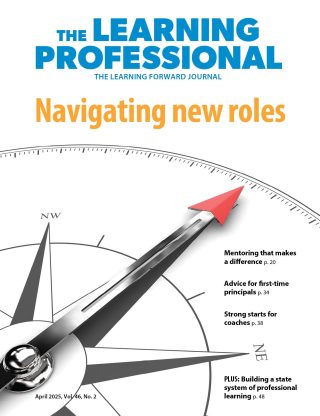FEATURE ARTICLE
How To Be A Wise Consumer Of Coaching
Strategies teachers can use to maximize coaching's benefits
By Learning Forward
February 2011
Vol. 32 No. 1
Read the remaining content with membership access. Join or log in below to continue.
Sed ut perspiciatis unde omnis iste natus error sit voluptatem accusantium doloremque laudantium, totam rem aperiam, eaque ipsa quae ab illo inventore veritatis et quasi architecto beatae vitae dicta sunt explicabo. Nemo enim ipsam voluptatem quia voluptas sit aspernatur aut odit aut fugit, sed quia consequuntur magni dolores eos qui ratione voluptatem sequi nesciunt. Neque porro quisquam est, qui dolorem ipsum quia dolor sit amet, consectetur, adipisci velit, sed quia non numquam eius modi tempora incidunt ut labore et dolore magnam aliquam quaerat voluptatem.

References
Hansen, P. (2008). Mathematics coaching handbook: Working with teachers to improve instruction. Larchmont, NY: Eye on Education.
Hull, T. H., Balka, D.S, & Miles, R.H. (2009). A guide to mathematics coaching: Processes for increasing student achievement. Thousand Oaks, CA: Corwin Press.
Knight, J. (2007). Instructional coaching: A partnership approach to improving instruction. Thousand Oaks, CA: Corwin Press.
Lockwood, J.R., McCombs, J.S., & Marsh, J. (2010, September). Linking reading coaches and student achievement: Evidence from Florida middle schools. Educational Evaluation and Policy Analysis, 32(3), 372–388.
Morse, A. (2009). Cultivating a math coaching practice: A guide for K-8 math educators. Thousand Oaks, CA: Corwin Press.
West, L. & Staub, F.C. (2003). Content-focused coaching. Pittsburgh, PA: University of Pittsburgh.
Yopp, D., Sutton, J., & Burroughs, E. (2010). Teacher needs inventory. Bozeman, MT: Examining Mathematics Coaching (EMC), Montana State University and RMC Research Corporation.
Learning Forward is the only professional association devoted exclusively to those who work in educator professional development. We help our members plan, implement, and measure high-quality professional learning so they can achieve success with their systems, schools, and students.
Recent Issues
LEARNING DESIGNS
February 2025
How we learn influences what we learn. This issue shares essential...
BUILDING BRIDGES
December 2024
Students benefit when educators bridge the continuum of professional...
CURRICULUM-BASED PROFESSIONAL LEARNING
October 2024
High-quality curriculum requires skilled educators to put it into...
LEARNING TO PIVOT
August 2024
Sometimes new information and situations call for major change. This issue...













